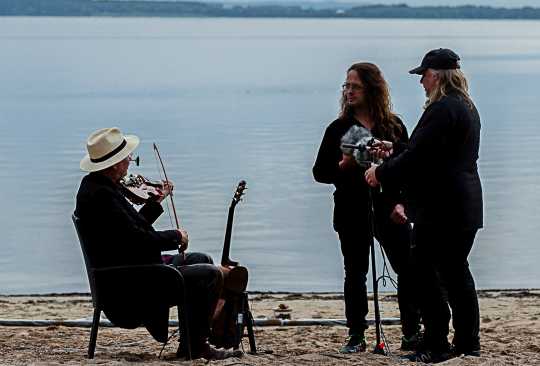|
In the same way that a recipe lists all the ingredients going into the pot, the title of this album itemizes precisely the source of what we can expect to hear. But the proof of the pudding is in the eating and in this case it turns out to be time well spent, taking us into a musical world which proves to be more than the sum of its parts.
Mats Edén and Stefan Östersjö are two Swedish musicians with different but overlapping backgrounds. Edén is a fiddle-player and composer who studied music and now teaches at the Malmö Academy of Music, but much of his work has centered on folk music. Östersjö is a guitarist, working mainly in the classical and contemporary music fields but, like Edén, he has collaborated extensively across musical and artistic genres. For this joint project the emphasis has been on free improvisation, but in partnership with sounds from the natural world. Wind, water, strings, bow was recorded next to the Vombsjön, a lake in southern Sweden, and the instrumentation might be thought of as a deconstruction of a jazz quartet format: two front players and a rhythm section. The latter is provided here by the sound of water lapping on the shore along with wind roaring through the strings of a specially adapted guitar suspended from a tree, a contemporary take on an aeolian harp. The effect of this is to process the wind sound, giving it an extended timbre and a more specific tonality.

|
|
The reason for choosing to record at Vombsjön was not arbitrary. With our growing understanding of climate change, its history and its implications for the future, the issue has increasingly been acknowledged in the work of musicians and composers. Terje Isungset, in his work with ice music and mostly recently in his current album Glacial Poetry, recognizes and draws attention to the endangered fragility of ice. Östersjö and Edén (Edén plays with Isungset in the present manifestation of the folk band Groupa) are here creating music from the other end of the process. We learn from the accompanying booklet that Vombsjön was formed (albeit 14,000 years ago) from the melting of glaciers, but now of course that process is accelerating rapidly.

|
|
In keeping with the album's prosaic title the seven tracks are also named schematically and without ostentation, “Vombsjön I” through to “Vombsjön VII”, but the music itself is anything but clinical. With a background of considerable musical ability as a given, the approach of both players is one of musical exploration, of discovery, and listening to their playing there is a sense of witnessing real invention, music produced in the moment, only possible through improvisation. Wind, water, strings, bow is described in the booklet (by Norwegian musician Tellef Kvifte, who released and co-produced the album) as “evocative and meditative.” The music is also in a very real sense ambient, but for any skeptics put off by such labels be reassured, it is not dull. There are certainly periods of calm and there is an implicit preference to err on the side of understatement, but at times it bustles with activity, with the two musicians producing a wealth of textures and rhythms from their instruments. Refreshingly, unlike some free improvisation, this is inclusive music which, having explored all kinds of gritty atonality, can unexpectedly but quite naturally edge into the familiar tones of the Scandinavian fiddle tradition. And when we're talking about 14,000 years that's modern.
Further reading:
Terje Isungset - Glacial Poetry
Benedicte Maurseth - Harr
Groupa - Silent Folk
An interview with Mats Edén
|
